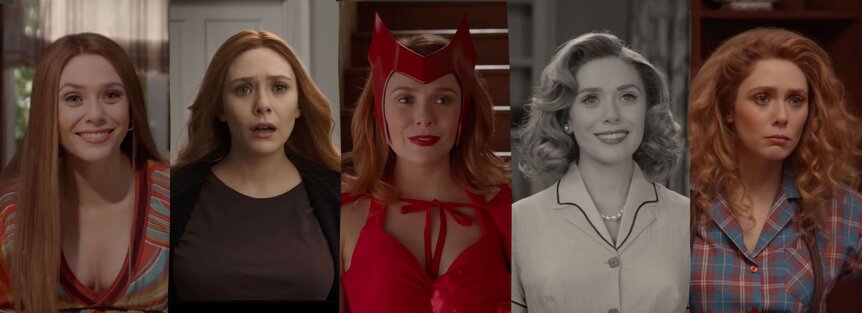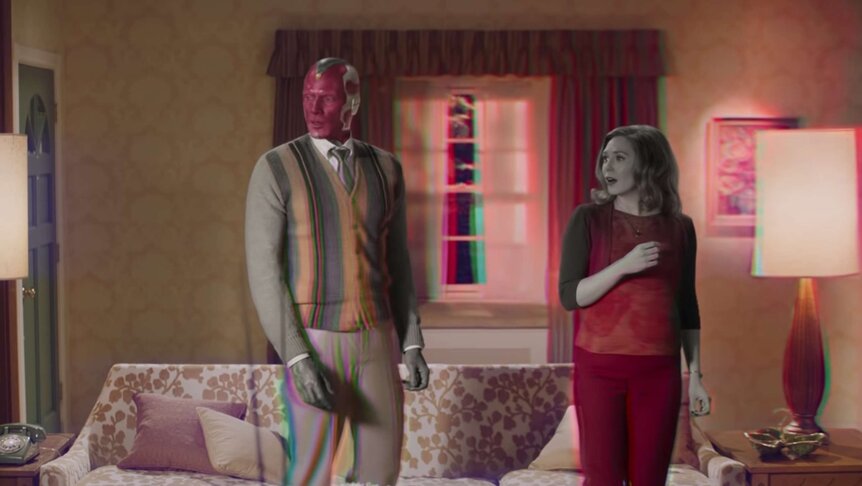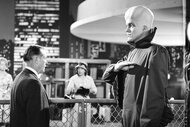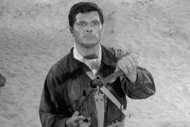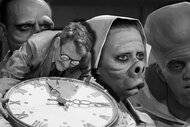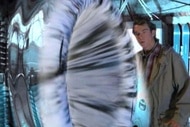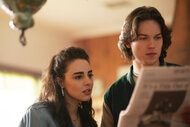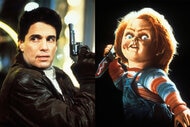Create a free profile to get unlimited access to exclusive videos, sweepstakes, and more!
Breaking down the WandaVision trailer and its promising manipulation of genre and style
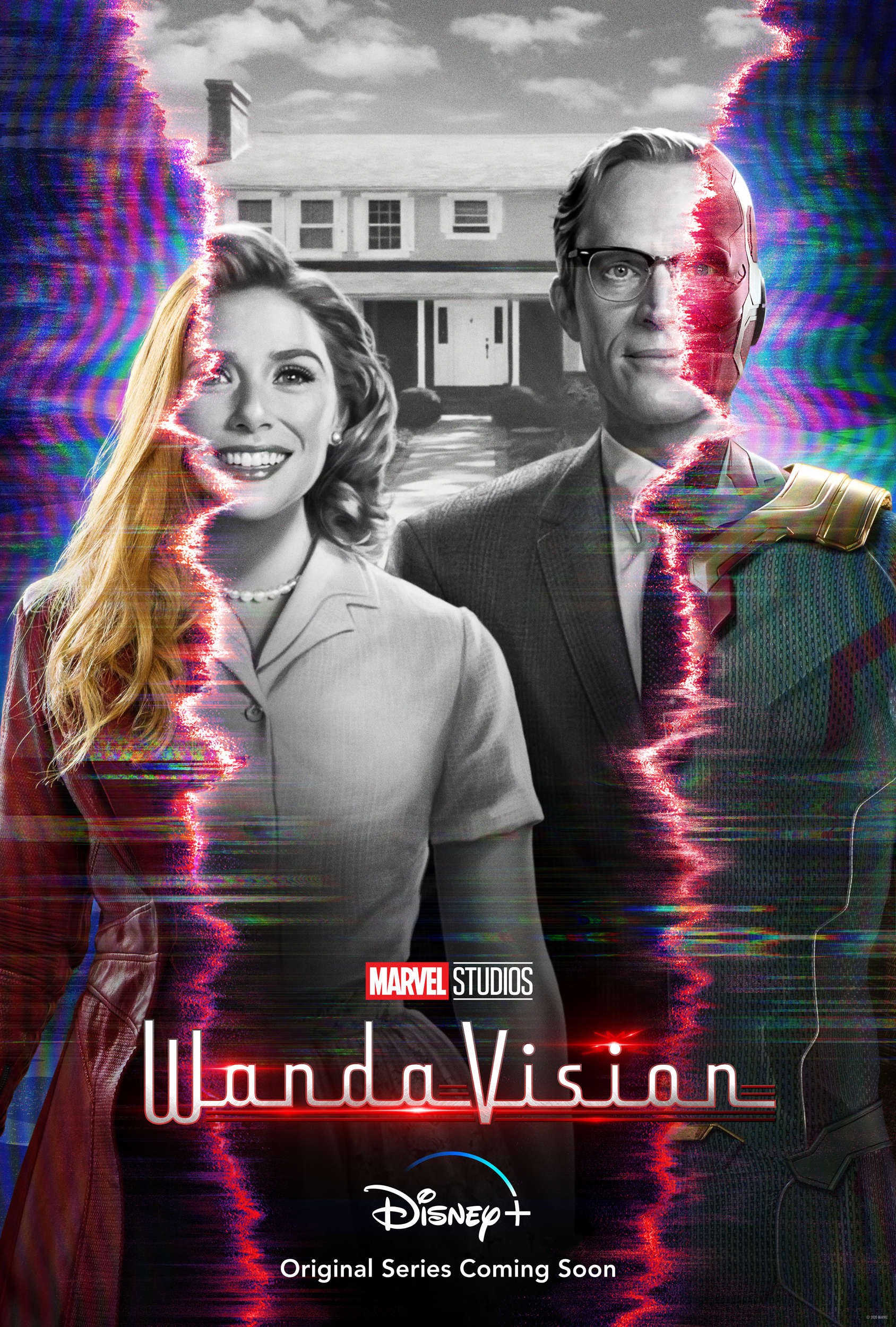
The (not even) 90-second WandaVision trailer is out, and oh man, what a trailer. If you haven't seen the trailer yet, watch it immediately. Now. Right now. It's right here. Go! And if you've already seen it, watch it again.
OK. Are we all ready now? Excellent. Now let's break down what we've just seen.
If you're like, "I have absolutely no idea what I just watched," then we're definitely in the same boat. But as long as you think what you just saw was cool (and will never hear "Twilight Time" by The Platters in the same way), then we're good to go. The show is supposedly drawing on the comic storylines The Vision and House of M, but the trailer itself is extraordinarily cryptic, and perhaps all we can ascertain narratively is that it's going to be real topsy-turvy.
From the trailer alone, what immediately appears to set WandaVision apart from the rest of the MCU is how it seems to be setting a genre-bent precedent of a very different kind. The Marvel Cinematic Universe isn't a stranger to combining genres — many of the films could be considered superhero-comedy, while many of the Netflix shows ventured into the territory of noir, crime, and thriller. But what's so curious about this is that it embraces not merely a combination of its stylistically unified antecedents (some of which are heavily suggested in the trailer, including the black-and-white suburban husband-and-wife sitcom, intense sci-fi drama, etc.), but also a distinct traversal of genre, style, and era (oh yes, we spotted those '80s outfits and many possible decades of television represented).
At D23, Kevin Feige described the series as a combination of a "classic sitcom" and "Marvel epic." Elizabeth Olsen (who plays Wanda/Scarlet Witch) described it as a "mash-up between American sitcoms throughout the decades and Marvel film with these characters." Without the trailer, it's quite hard to imagine what both of these descriptions actually might look like; the show could be many different things. But in context with the trailer, WandaVision appears to not simply be a sort of comedy-drama like many of the films, but instead, a totally distinct amalgam of these elements, themselves used as narrative and character devices. It isn't just a humorous Marvel epic with Tony Stark cracking jokes or Jessica Jones downing her whiskey with a snide remark. We're just going to have to wait and see, but it looks like it's going to be something completely different — a show that embraces and pays homage to the stylistic history of American television while really paying little heed to the expectation of conforming to anything on TV right now. (Naturally, it does have the luxury of being a piece of Disney media, which means people are going to watch it anyway despite not being similar to anything on TV right now. But that doesn't mean it's not taking a risk.)
The idea that WandaVision will employ various forms of genre and style manipulation is very, very exciting. Television and film's rich history provides us with a sort of "ontology of genre" — that is, combinations of different criteria and clues help us categorize different pieces of media and make connections between them. For instance, the recognizable black-and-white suburban husband-and-wife sitcom that's presented in the majority of the trailer might immediately bring to mind I Love Lucy (comedy, multi-cam, archetypical man and woman characters), while the sci-fi mystery briefly shown at 1:06 of the trailer might be reminiscent of something like Close Encounters of the Third Kind (scientific elements, government agents, lots of dark scenes shrouding the whole film in suspense). These pieces of the show appear to be embodying already-established norms of style. Eras of television are marked by certain cinematic quirks like costumes, color palette, or the ways characters are dramatized or played by actors. There are also previously established combinations of genre that have grown more and more popular over the years (and especially within the age of peak TV), like blends of science fiction and other genres (Westworld, Legion, Wynonna Earp, 12 Monkeys, just to name a few), which also makes WandaVision a terrific platform for this (the Venn diagram intersection of superhero media and science fiction is quite large).
But, of course, the trailer demonstrates that it seems to go way beyond this and takes on a life of its own. Instead of simply combining individual categorizations to create a new unified style (like a blend of sci-fi and western for the first two seasons of Westworld and sci-fi and dystopian for the third), WandaVision appears to explicitly play with the boundaries between them to feed its narrative — it's not just a Marvel epic in a sitcom setting. In fact, it doesn't even seem to look like it's that at all — it's using multiple styles and multiple genres at different times (and sometimes in combination) to create a cohesive story. It's using both the breaks in these genre norms with (Wanda and Vision freaking out at being unable to remember simple facts about themselves, or moments where they both gaze in amazement as the world appears to digitally change around them) and without acknowledgment (Wanda appears to telepathically pour a glass of wine, Vision seamlessly transitions between his android and his human face after entering the house) to give us clues as to what their story is in the trailer and to craft the characters' story and backstory. Do we even have to mention the (not-so-sneaky) aspect ratio change in the middle of the trailer?
The transformation between styles is happening before the viewers' eyes and in the world of the characters, which is often not seen on television. In sitcoms, stylistic elements like the laugh track are hardly ever mentioned (unless the show is purposely self-aware, like The Fresh Prince of Bel-Air often leaned into with very effective fourth-wall breaks), but nonetheless, the characters live in a highly stylized world. In the trailer, Wanda and Vision recognize that something is wrong, and things transform around them — their literal self-awareness of genre and style of the world they live in shapes the story.
TV shows might have one or two distinct episodes that break form or style, like musical episodes or even Agents of S.H.I.E.L.D.'s black-and-white episode in its final season. But it's hard to think of a contemporary show that, if the trailer depicts it accurately, seems to so blatantly and directly employs the power of manipulating genre and style by harnessing all of the connotations of decades of television (if you do think of one, we'd love to hear it). We've been conditioned to watch television in certain ways, just as we have been for other forms of media — for instance, if we're watching a sitcom, we don't find a laugh track bizarre at all, and we also understand the concept of flashbacks and much of the cinematic form that it takes on. (For instance, if you've seen Arrival, you'll know how it plays with the viewer's expectations of flashbacks.) So every time WandaVision uses this black-and-white sitcom-style or there are certain things that we, as viewers, might automatically be expecting. And if the show either conforms to these ideals or twists them, it also changes how we see the show, the story, and its characters.
Paul Bettany (Vision himself) described the series as "super avant-garde and weird" — perhaps we might not call the trailer itself "avant-garde," but when placed in comparison with other shows on TV, it might as well be avant-garde. The bottom line is that WandaVision is breaking Disney boundaries — and even pushing the conventions of commercial subscription TV, video-on-demand, and franchise media — and it's incredibly exciting. This isn't to say WandaVision is something completely novel or automatically in a league of its own. Nevertheless, it's also potentially laying the groundwork for shows (and creators) to be more playful in their premises and not take themselves too seriously, especially if they're being granted a full season order right off the ground with a huge budget.
In many ways, it feels surprising that WandaVision was developed with such complex, mysterious, and genre-busting conventions when traditional Disney fare has been, for the most part, formulaic and stylistically predictable (which isn't to say it isn't entertaining or exciting) because it's effective for large swaths of its audience base. But this usage of genre and style as a key element of the show brings so many exciting possibilities to the table, and we really hope WandaVision uses them well. If the trailer is any indication, it's at least going to be one wild ride, and we're 100% here for it.
